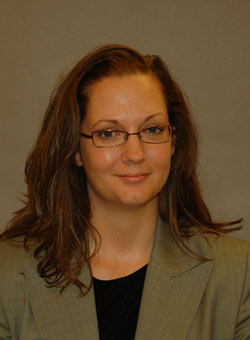
Kari Clase

Associate Professor
Ph.D.-2001 Purdue University
Training Group(s):
Biotechnology
PULSe Contributor - not currently hosting students for laboratory rotations or recruiting students in the laboratory
Current Research Interests:
Prof Clase’s lab investigates the mechanisms controlling neural cell proliferation and differentiation within brain tumors through proteomic and metabolic analysis. She is also interested in bringing grand challenge research problems into the classroom to engage students in the process of research and help them learn in an authentic interdisciplinary context. In order to facilitate this process, she explores the use of emerging technologies for learning and building collaborative communities. She currently teaches multiple courses covering topics in biotechnology, bioinformatics, biological design and drug discovery to engineers, scientists and technologists. Her currently funded projects include collaborators from multiple disciplines and an impact on students from K-12 to graduate education.
Selected Publications:
Ertmer P, Freemyer S, Adedokun O, Clase KL (in press) The Grand Challenge: Helping teachers learn/teach cutting edge science via a PBL Approach. 2012 Annual Meeting of the American Educational Research Association, Vancouver, British Columbia.
Clase KL, Halverson K, Heyden R (in press) Using Second Life in a formal STEM classroom to learn how to represent annotated genomes and develop a sense of community. 2012 Annual Meeting of the National Association Research in Science Teaching, Indianapolis, Indiana.
Goodpaster K, Adedokun O, Kirkham L, Ertmer P, Clase K, Weaver G (in press) The impact of a professional development workshop on rural STEM teachers’ self-efficacy and biofuels knowledge. (in press). 2012 Annual Meeting of the National Association Research in Science Teaching, Indianapolis, Indiana.
Adamo-Villani N, Clase KL, Heyden R, Wiecha J (in press) Constructing self-discovery learning spaces online: Scaffolding and decision making technologies. Hai-Jew, Shalin (Ed.). IGI Global Publishing.
Clase KL, Gundlach E, Peleaz N (2010) Calibrated peer review for computer-assisted learning of biological research competencies Biochemistry and Molecular Biology Education, 38, 290-295.
Clase KL (2009). Engagement Through a dual credit initiative resulting in collaborative partnerships to create pre-engineering biotechnology curriculum for the K12 classroom. Proceedings of Frontiers in Education 39th Annual Conference: IEEE Education Society, October.
Clase KL, Adamo-Villani N, Gooding L, Yadav A, Karpicke J, Gentry M (2009) Enhancing Creativity in Synthetic Biology with Interactive Virtual Environments. Proceedings of Frontiers in Education 39th Annual Conference: IEEE Education Society, October.
Clase KL (2008) Design and implementation of an interdepartmental biotechnology program across engineering technology curricula. Journal of Technology Studies, 34, 12-19.
Clase KL, Hein PW, Pelaez NJ (2008) Demand for interdisciplinary laboratories for physiology research by undergraduate students in biosciences and biomedical engineering. Advances Physiology Education, 32, 256-260.
Clase, K. L. (2007) Promoting Creativity and Innovation in an Entrepreneurial Certificate Program through Science and Technology Inquiry-Based Learning Modules for Introductory Biotechnology. Technology Interface. Fall 2007.
Clase KL, Mitchell PJ, Dorman CM, Johnson SE, Hannon K. (2000) FGF5 stimulates expansion of connective tissue fibroblasts and inhibits skeletal muscle development in the limb. Developmental Dynamics. 219 (3): 368-80.
Steenstrup T, Clase KL, Hannon KM. (2000) Rapid quantification of cell numbers using computer images. Biotechniques. 28(4): 624-6, 628.
Morris RC, Galicia MC, Clase KL, Elliott MS. (1999) Determination of queuosine modification system deficiencies in cultured human cells. Mol Genet Metab. 68 (1): 56-67.
Kudla AJ, Jones NC, Rosenthal RS, Arthur K, Clase KL, Olwin BB. (1998) The FGF receptor-1 tyrosine kinase domain regulates myogenesis but is not sufficient to stimulate proliferation. Journal of Cell Biology. 142 (1): 241-50.
Hannon K, Kudla AJ, McAvoy MJ, Clase KL, Olwin BB. (1996) Differentially expressed fibroblast growth factors regulate skeletal muscle development through autocrine and paracrine mechanisms. Journal of Cell Biology. 132 (6): 1151-9.
- Faculty Profile

